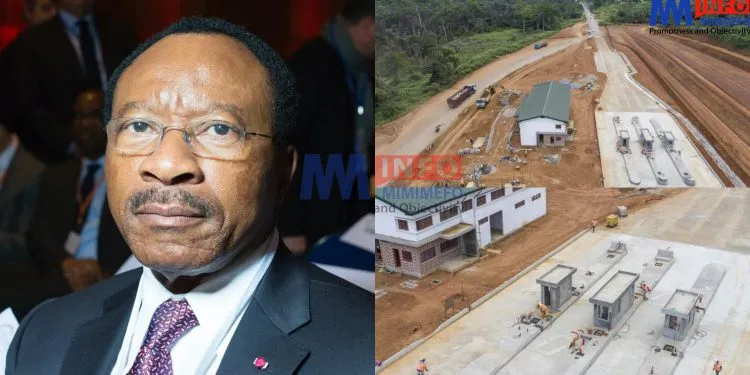Cameroon’s Minister of Public Works, Emmanuel Nganou Djoumessi, has expressed optimism that within the next two years, the persisting challenges in the country’s road infrastructure will become a thing of the past. Speaking on the Sunday flagship radio program, “Cameroon Calling” on CRTV, the Minister outlined plans to utilize the funds generated from the construction of automated tollgates on national roads to enhance the current poor conditions of Cameroon’s road network.
The construction of the 14 tollgates is entrusted to Fayat Group, a French-based company, with Tollcam, a joint venture established by the Razel BEC-Egis Projects consortium, overseeing the estimated FCFA 42 billion project. According to the terms of the public-private partnership contract, Razel BEC will operate the tollgates for 18 years after completion, aiming to recover its investment before transferring control to the government by 2039. The government is expected to accrue approximately 49 billion FCFA by the end of this partnership.
However, critics argue that this sum alone may be insufficient to address the dire state of the roads, with some currently in a state of disrepair. When the automated tollgate project was initially introduced, there was public outcry as citizens demanded improved roads instead, particularly on routes like the Bamenda-Babajou road, which has faced prolonged construction delays. The government attributes these delays to insecurity in the Northwest and Southwest regions, raising concerns about the allocation of borrowed funds for road construction.
The existing non-automated tollgates charge 500 FCFA per car, excluding ambulances and military vehicles, while the newly constructed automated tollgates impose higher rates on road users. The financial burden on citizens persists despite the fact that, as of 2022, only 9,539.5 km out of the total 121,873.93 km of roads in the country’s network have been tarred or paved, leaving over 50% of national roads in a state of disrepair, contributing to accidents and loss of life.
Minister Djoumessi’s optimism about road improvement through tollgate funds will need further convincing, especially considering the projected timeline until 2039. Given the substantial costs involved in road construction in Cameroon, the anticipated 49 billion FCFA over 18 years may be regarded skeptically.
Automated Tollgates Construction Locations:
- Nsimalen (Yaoundé-Mbalmayo)
- Mbankomo (Yaoundé-Mbankomo)
- Tiko (Douala-Mutenguene)
- Edea (Douala-Edea)
- Boumnyebel (Edea-Boumnyebel)
- Nkometou (Yaoundé-Obala)
- Bayangam (Bangangte-Bafoussam)
- Bafia (Obala-Bafia)
- Mbanga (Douala-Mbanga)
- Manjo (Mbanga-Manjo)
- Bandja (Bafang-Bafoussam)
- Matazen (Bafoussam-Bamenda)
- Foumbot (Bafoussam-Foumbot)
- Dschang (Dschang-Bamougoum)
Construction Details by Razel BEC:
Razel-Bec’s involvement in the tollgate construction encompasses the development of 14 toll roads along the four main trunk roads in Cameroon. This includes the implementation of a communication system for users through a website, a 50 m-wide toll plaza with 2 m-wide lane dividers and 50 m aprons on either side, 14 two-story operational buildings, three maintenance centers in Tiko, Mbankomo, and Bandja, an operations and maintenance center in Mbankomo, 42,000 m² of landscaped parking areas and shopping areas, as well as automatic vehicle recognition and a data reporting system.



